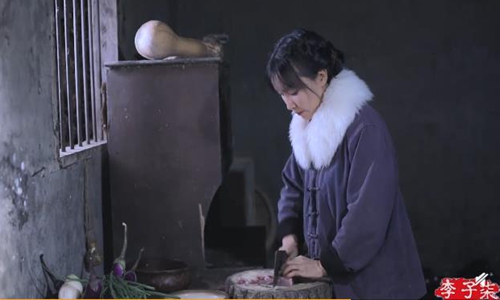HOME >> CHINA
Vlogger influence sparks debate on methods used to spread Chinese culture overseas
By Hu Yuwei and Li Qiao Source:Globaltimes.cn Published: 2019/12/10 3:47:32

Photo: Screenshot of Li Ziqi Weibo account
A Chinese vlogger who has millions of international fans has stirred debate on the methods used to promote Chinese culture overseas.
Experts said the role of China's official institutions in facilitating international cultural communication is irreplaceable, but suggested authorities learn innovative ideas from web celebrities.
Li Ziqi, a Chinese internet celebrity, has found herself at the epicenter of Chinese social media as netizens discussed her contributions in promoting Chinese culture overseas. On Weibo, the topic of "whether Liziqi is promoting Chinese culture" has attracted 760 million views and 62,000 engagements as of Monday.
Li's videos focus on traditional Chinese food and showcase the bucolic lifestyles of Chinese farmers. Li's YouTube channel has 7.43 million followers, more than BBC, and her videos do not offer English subtitles.
Global audiences have expressed their love for her videos and admiration for her rural life. Many have started referring to her as a spokesperson for the Chinese pastoral lifestyle and use her videos for "relaxation therapy."
Many domestic Chinese fans recognize her success in promoting Chinese traditional culture, and some even said that "she is more influential than 10 Confucius Institutes."
"Her videos don't have much rhetoric, but show the beauty of Chinese culture gently and vividly, which is much better than some propaganda-style discourse in traditional cultures products," said one Chinese netizen.
One of her videos introducing Chinese paper-making that originated during the Han Dynasty has been viewed 7.07 million times on YouTube.
The Confucius Institute had yet to comment on Li's achievements in promoting Chinese culture overseas on social media platforms after Global Times sent an interview request.
Over the past 15 years, 550 Confucius Institutes and 1,172 Confucius classrooms have been established in 162 countries and regions around the world.
"Such a creative approach in promoting Chinese cultures is laudable, but its impact is not comparable to that of Confucius Institutes. Confucius Institute serves more as a language platform, and its professionalism and influence cannot be replaced," Li Peihua, with the Confucius Institute in Barcelona, Spain, told the Global Times.
"Cultural promotion via official way and civil recreational channels are equally important. We need to present good stories about China from multiple dimensions," Liang Yanmin, a professor at Beijing Language and Culture University, told the Global Times.
"Confucius Institutes can learn from some innovative ideas of video bloggers in cultural promotion. With the trend of learning Chinese at a younger age, the authorities should learn how to make our stories more attractive," said Liang.
Posted in: SOCIETY